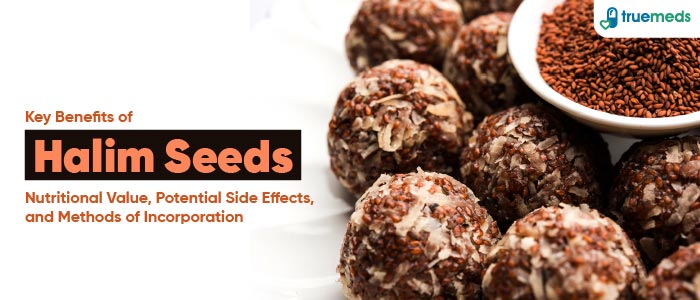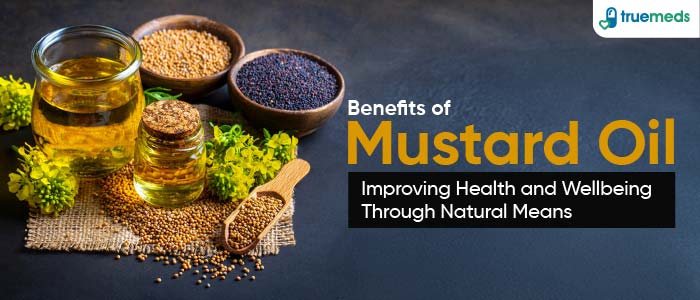Category: Food & Nutrition
-

Singhara (Water Chestnuts): Nutritional Value, Benefits, Uses & Precautions
Singhara is also referred to as paniphal in Hindi and is commonly known as the water chestnut in English. Its scientific name is Trapa natans. It is an annual aquatic free-floating plant that grows in shallow water bodies, ponds, or marshes. The edible portion of the water chestnut plant is its fruit, commonly referred to…
-

Halim Seeds Benefits: Nutrition, How to Use Them, and Side Effects
Garden cress seeds, often known as Halim seeds (Lepidium sativum), are small but potent seeds that are incredibly nutrient-dense. Because of their traditional therapeutic qualities and potential health advantages, they have been utilised for centuries in various cultures. Their remarkable nutritional profile and numerous applications have contributed to their growing reputation as a beneficial dietary…
-

Mustard Oil: Health Benefits, Nutritional Facts, and Possible Side Effects
Mustard oil, derived from mustard seeds, has been a staple in many kitchens and medicine cabinets for centuries. Known for its distinctive flavour and pungent aroma, this versatile oil is more than just a cooking ingredient. It is packed with essential nutrients and may offer a range of traditional and potential health benefits that can…
-

Fennel Seeds: Health Benefits, Nutritional Value, and Precautions
Fennel seeds, commonly known as Saunf (Foeniculum vulgare), are an aromatic herb belonging to the carrot (Apiaceae) family [1]. Known for their slender, pale green or brown seeds and distinct liquorice-like flavour, they offer more than just culinary value. Traditionally, fennel seeds have been used to support healthy digestion, help reduce mild bloating and gas,…
-

Health Benefits of Coconut Water: Nutritional Facts and Precautions
Coconut water is a natural, clear liquid found inside young green coconuts, recognised as a refreshing and hydrating beverage. It is primarily composed of water and contains essential electrolytes, making it a popular choice for rehydration. Its naturally low-calorie and high-electrolyte profile offers several potential health benefits. These benefits are attributed to its natural composition…
-

Essential High-Protein Foods for a Balanced Indian Diet and Healthy Lifestyle
Protein is a vital macronutrient that supports overall health by building and repairing body tissues, strengthening muscles and bones, and boosting immunity [1]. It also plays a key role in hormone and enzyme production, which helps keep your metabolism and bodily functions running smoothly. Daily protein requirements can vary based on factors like age, weight,…
-

Sugarcane Juice: Health Benefits, Nutritional Value & Side Effects
Sugarcane juice is a traditional beverage in India loaded with essential vitamins, minerals, and antioxidants. While it is refreshing and provides energy, it is important to remember that it is also a source of natural sugar and should be consumed in moderation, especially by individuals managing blood sugar levels. In this guide, discover the key…
-

Amla (Gooseberry) Juice Benefits on an Empty Stomach
Amla, also known as Indian Gooseberry (Emblica officinalis), has been valued in Ayurveda for centuries as a powerhouse of nutrition [1]. Packed with exceptionally high levels of Vitamin C, antioxidants, and essential minerals, amla juice offers numerous health benefits. Drinking it on an empty stomach in the morning can enhance nutrient absorption and boost overall…
-

Health Benefits of Brinjal (Baingan) – Nutrition, Diet, and Precautions
Brinjal, also known as eggplant or baingan, is a versatile and nutrient-dense fruit (botanically a berry) commonly consumed as a vegetable. It’s a key component in global cuisines, especially in India. Rich in essential vitamins, minerals, dietary fibre, and beneficial plant compounds known as antioxidants, brinjal is recognized for its potential to support various aspects…
-

Bottle Gourd: Uses, Nutrition, Health Benefits and Side Effects
Bottle gourd, commonly known as lauki (Lagenaria siceraria), may look like a simple vegetable, but it is loaded with nutrition and health benefits [3], [5]. Used in Indian kitchens for centuries, it finds its way into curries, soups, and refreshing juices. In Ayurveda, lauki has long been valued for its traditional healing properties [5]. Rich…